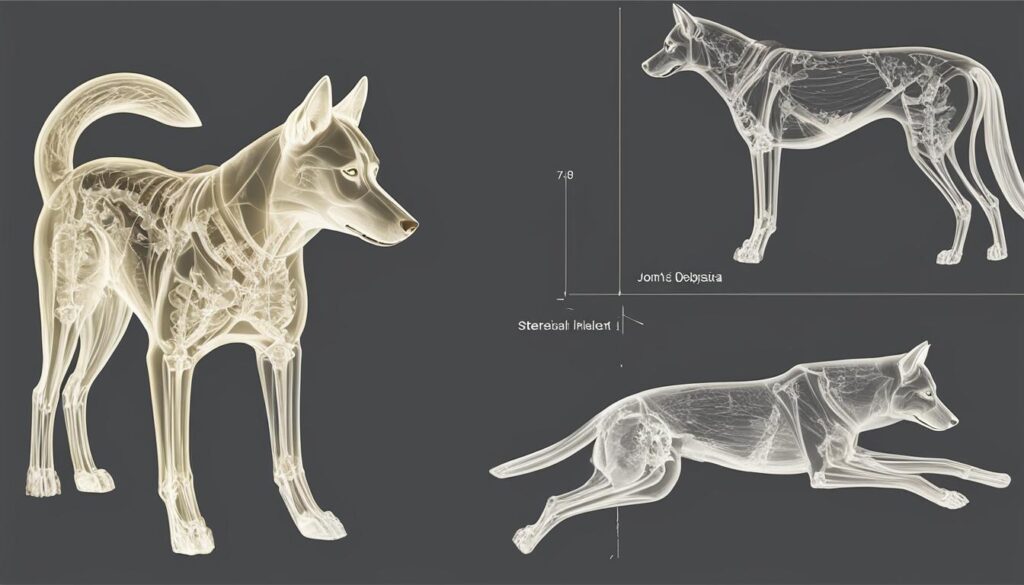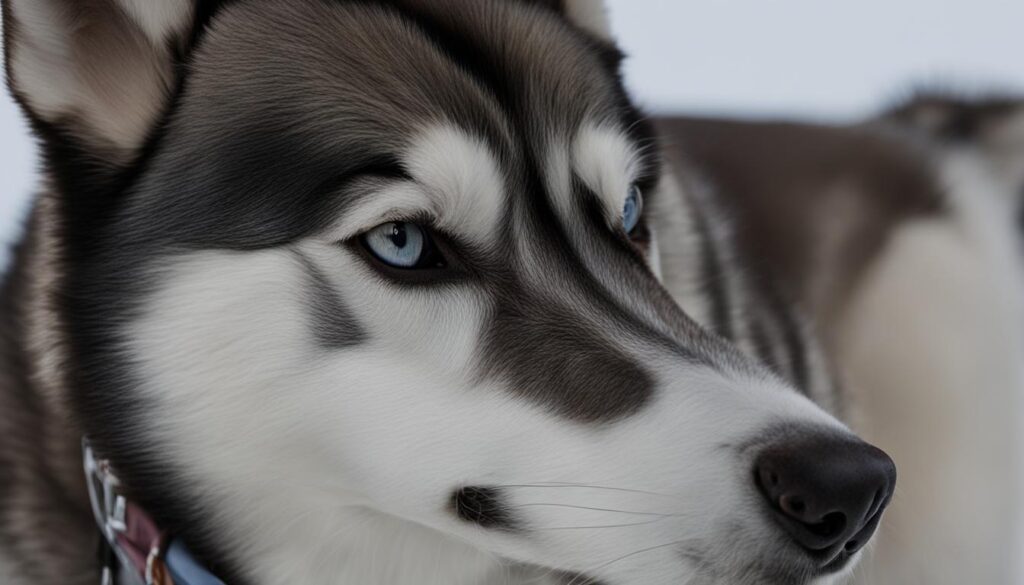Siberian Husky Lifespan: Learn Their Life Expectancy
Are you considering adding a Siberian Husky to your family? It’s essential to understand their lifespan and life expectancy to ensure you provide them with a fulfilling and healthy life. Siberian Huskies are known for their stunning blue eyes, gorgeous coats, and friendly nature. In this article, we will explore how long Siberian Huskies live, their average lifespan, and factors that can influence their longevity.
Key Takeaways:
- The average lifespan of a Siberian Husky is 12-15 years.
- Factors such as genetics, breeding, diet, exercise, and regular vet check-ups can affect a husky’s lifespan.
- Responsible breeding practices and genetic health screenings contribute to extending a husky’s lifespan.
- Choosing a well-balanced diet and providing regular exercise and vet check-ups are crucial for maintaining a healthy and active husky.
- Understanding common health issues for huskies and addressing them promptly with proper veterinary care can help increase their lifespan.
Factors Affecting Husky Life Expectancy
Several factors can influence the life expectancy of a Siberian Husky. These factors include breeding practices, genetics, diet, exercise, and regular vet check-ups.
Choosing a responsible breeder is crucial in ensuring the health and longevity of a Siberian Husky. A reputable breeder will prioritize the health and temperament of their dogs, conduct genetic health screenings, and socialize their puppies. By selecting a well-bred husky, you can reduce the chances of inherited health issues and promote a longer lifespan.
A balanced diet plays a significant role in the overall well-being of a husky. Providing a nutritionally rich diet consisting of whole foods and proper portion control is essential. This helps to maintain a healthy weight, preventing obesity-related health problems and extending the husky’s lifespan.
Exercise is vital for a husky’s physical and mental health. Regular physical activity helps prevent mobility issues, keeps the husky fit, and enhances their overall quality of life. Whether it’s long walks, jogs, or engaging in agility training, adequate exercise contributes to a healthier and longer life for your husky.
Regular vet check-ups are an essential part of husky care. These visits allow for early detection and treatment of any health concerns. Routine examinations, vaccinations, and preventive treatments ensure that potential health issues are addressed promptly, ultimately increasing the husky’s lifespan.
“Choosing a responsible breeder, providing a balanced diet, giving regular exercise, and scheduling regular vet check-ups are all crucial factors that can positively impact a Siberian Husky’s lifespan.”
Common Health Issues for Huskies
Siberian Huskies are generally a healthy breed, but like any other dog, they can be prone to certain health issues. Being aware of these common health concerns can help you take proactive steps to ensure the well-being of your beloved husky.
Hip Dysplasia

Hip dysplasia is a common orthopedic condition in huskies, where the hip joints do not develop properly. This can lead to mobility issues and even arthritis in later life. Regular exercise and controlling your husky’s weight can help manage this condition. Consult with your veterinarian if you notice any signs of discomfort or limping.
Eye Problems
Huskies are prone to various eye problems, including cataracts, progressive retinal atrophy, corneal dystrophy, and glaucoma. Regular eye exams are essential to monitor and address these issues early. Prompt veterinary care and specialized treatments can help preserve your husky’s vision and overall eye health.
Hypothyroidism

Hypothyroidism is a condition characterized by an underactive thyroid gland. It can affect huskies and may cause symptoms such as weight gain, decreased activity, and a dull coat. Regular veterinary check-ups and blood tests can help diagnose and manage this condition. Medication and a balanced diet recommended by your veterinarian can help regulate your husky’s thyroid function and improve their overall well-being.
By staying aware of these common health issues and providing regular veterinary care, you can help ensure a healthy and happy life for your Siberian Husky.
Caring for a Siberian Husky
To ensure the health and well-being of a Siberian Husky, it is important to provide proper care. This includes responsible breeding, a balanced diet, regular exercise, vet check-ups, and grooming.
Responsible Breeding
Choosing a responsible breeder is the first step in caring for a Siberian Husky. A reputable breeder prioritizes the health and temperament of their dogs. They conduct genetic health screenings to reduce the risk of inherited health issues. It is important to do thorough research, visit the breeder’s facility, and ask questions to ensure the husky puppy comes from a reputable source.
Balanced Diet
A balanced diet is essential to keep a Siberian Husky healthy and energetic. Provide nutritious whole foods that meet their dietary requirements. Avoid feeding them table scraps or foods that may be harmful to their health. Consult with a veterinarian for guidance on the appropriate diet for your husky’s age, size, and activity level.
Regular Exercise
Siberian Huskies are active dogs that require regular exercise to stay healthy and avoid behavioral problems. Engage in daily activities such as walks, jogs, or play sessions to help them burn off excess energy. Mental stimulation, such as puzzle toys or obedience training, can also keep them mentally sharp.
Vet Check-ups
Scheduling regular vet check-ups is crucial for monitoring a husky’s overall health and detecting any potential issues early on. A veterinarian can perform thorough examinations, administer preventive treatments, and advise on vaccinations, dental care, and parasite control. They can also provide guidance on specific health concerns related to Siberian Huskies.
Grooming
Huskies have thick double coats that require regular grooming to keep them healthy and comfortable. Brush their coats at least once a week to remove loose hair and prevent matting. Occasional baths using dog-friendly shampoos can help maintain the cleanliness of their coats. Pay special attention to their ears, nails, and teeth to ensure they are in good condition.
| Aspect of Care | Description |
|---|---|
| Responsible Breeding | Choose a reputable breeder who prioritizes health and temperament and conducts genetic health screenings. |
| Balanced Diet | Provide nutritious whole foods that meet their dietary requirements. |
| Regular Exercise | Engage in daily activities to keep the husky active and stimulated. |
| Vet Check-ups | Schedule regular vet check-ups to monitor their health and address any potential issues. |
| Grooming | Regularly brush their coats and provide occasional baths to maintain coat health. |
Conclusion
In conclusion, Siberian Huskies have an average lifespan of 12-15 years, making them a long-lived breed compared to other medium to large dogs. By implementing responsible breeding practices, providing a well-balanced diet, regular exercise, and consistent vet check-ups, husky owners can greatly enhance the lifespan and overall health of their beloved pets.
It is important to remember that each husky is unique, and individual care needs may vary. By treating them with love, care, and respect while providing a nurturing environment, owners can contribute to the happiness and longevity of their Siberian Huskies.
Understanding the common health issues that affect huskies, such as hip dysplasia, cataracts, progressive retinal atrophy, corneal dystrophy, and hypothyroidism, is crucial. Promptly addressing any potential health concerns with appropriate veterinary care can make a significant difference in the husky’s lifespan and overall well-being.
In summary, by being proactive in their care and understanding the specific needs of this beautiful breed, husky owners can ensure their dogs have a long, fulfilling life as cherished members of the family.
FAQ
How long do Siberian Husky dogs live?
The average lifespan of a Siberian Husky is 12-15 years.
What factors can affect a husky’s lifespan?
Several factors can influence the life expectancy of a Siberian Husky including genetics, breeding, diet, exercise, and regular vet check-ups.
What are some common health issues for Siberian Huskies?
Common health concerns for huskies include hip dysplasia, various eye problems, and hypothyroidism.
How can I care for a Siberian Husky?
To care for a Siberian Husky, it is important to choose a responsible breeder, provide a balanced diet, regular exercise, and vet check-ups, and maintain their coat health through grooming.
What is the conclusion of the Siberian Husky lifespan article?
By following responsible breeding practices, providing a well-balanced diet, regular exercise, and vet check-ups, and addressing any potential health issues promptly, husky owners can help increase the lifespan and overall health of their beloved pets.


